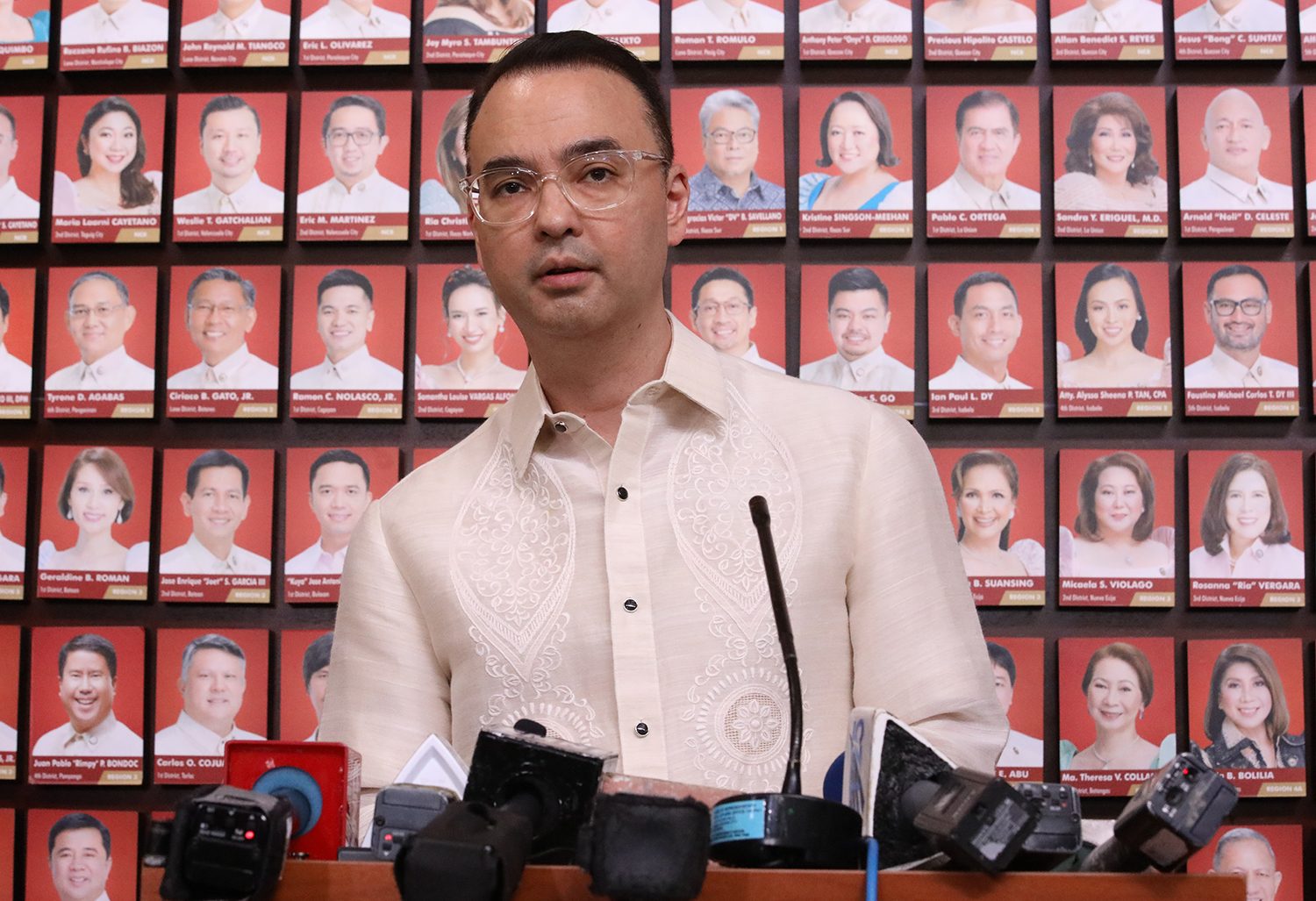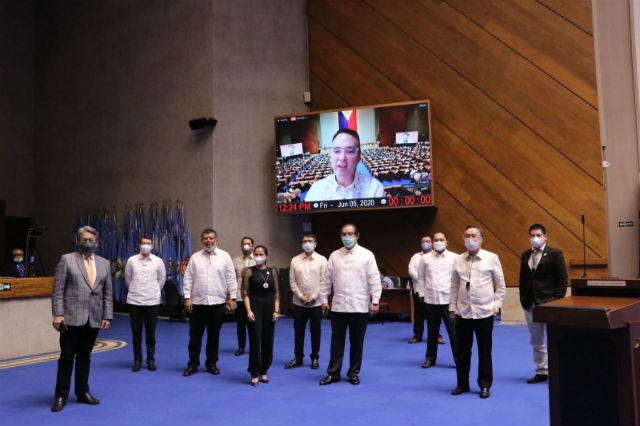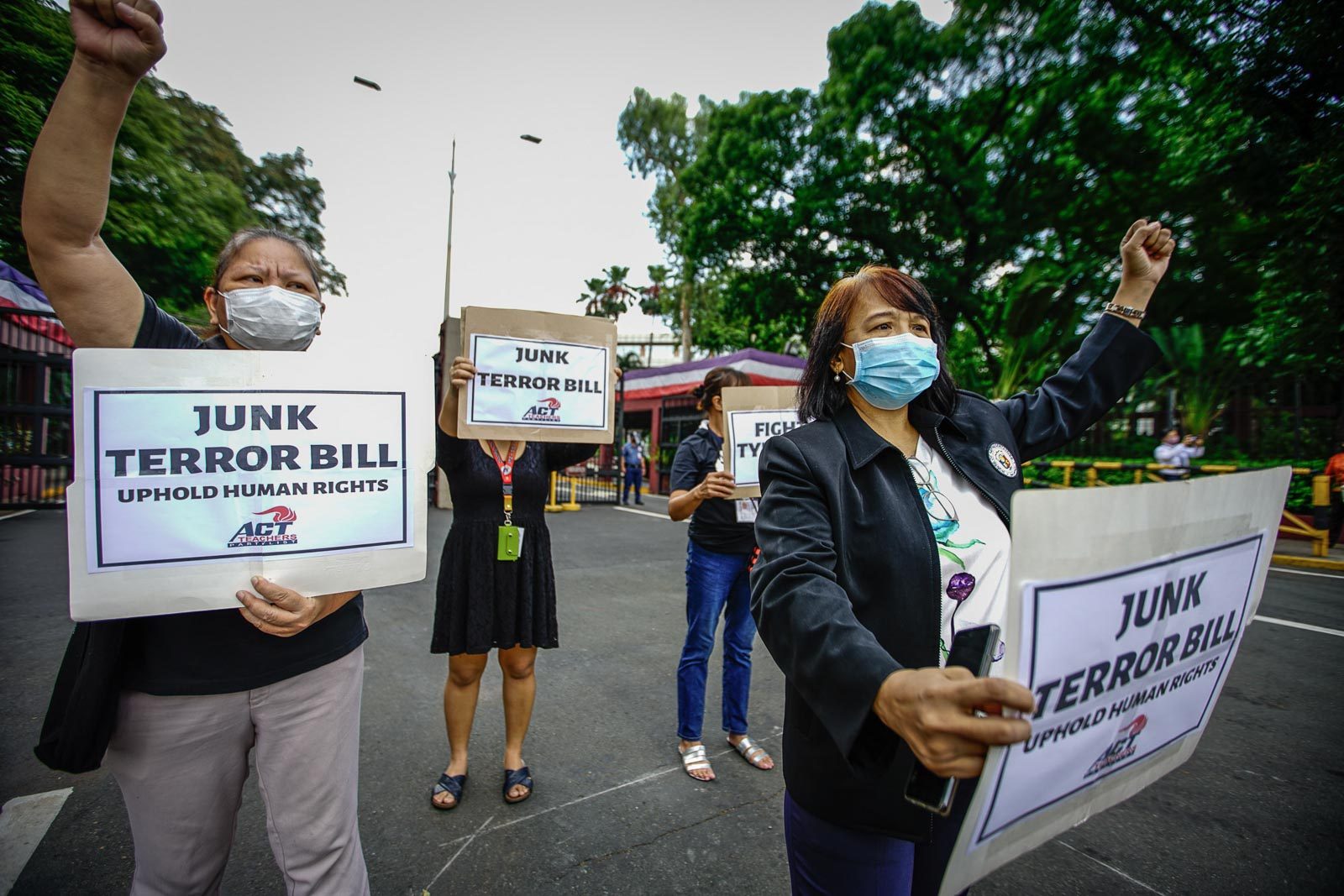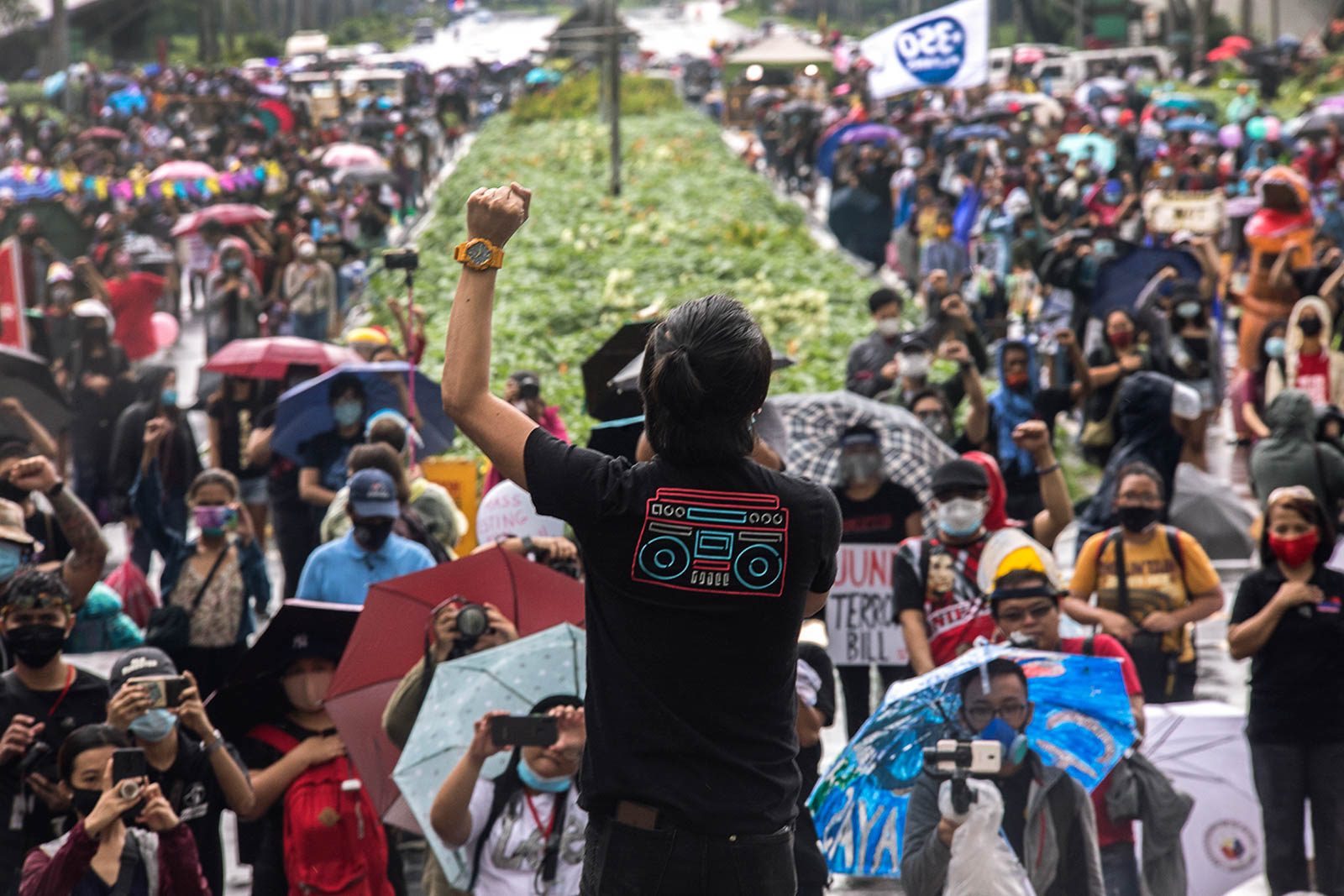SUMMARY
This is AI generated summarization, which may have errors. For context, always refer to the full article.

MANILA, Philippines – A Commander-in-Chief eager to please his generals, a Speaker loyal to the President, and lawmakers who turned a blind eye to the red flags – this is how the anti-terror bill was railroaded in the House.
For weeks, widening the net as to whom the government could tag as terrorists was not a top agenda for the lower chamber. Speaker Alan Peter Cayetano wanted the House to pass a number of bills responding to the coronavirus pandemic before the 18th Congress was to adjourn session sine die on June 5.
These COVID-19 measures had even been Cayetano’s excuse why the House did not immediately hear the bills renewing ABS-CBN’s franchise.
But when the House leadership was told President Rodrigo Duterte was about to certify the proposed Anti-Terrorism Act of 2020 as urgent, the lower chamber did what it has been historically known to do – bow down to the whims of the executive.
And Cayetano readily defended the President, who knows signing the anti-terror bill would appease the military and police generals who crafted it. (READ: ‘Terror law’: The pet bill of the generals)
“So tingnan ‘nyo po ang terrorism at insurgency sa ating bansa. Tumigil ba ito during the time of COVID-19? Hindi po,” Cayetano said in his speech on June 5. “So hindi ‘nyo po masisi ang Kongreso that we have to take action on how to deal with terrorism.”
(Look at terrorism and insurgency in our country. Did it stop during the time of COVID-19? No. So you can’t blame Congress that we have to take action on how to deal with terrorism.)
The public raged as the House passed the anti-terror bill, which allows a preliminary declaration as a terrorist, surveillance of suspected terrorists up to 90 days, their prolonged detention up to 24 days, and arrests without judicial warrants. (READ: EXPLAINER: Comparing dangers in old law and anti-terror bill)
Lawmakers’ inboxes piled up with emails from constituents convincing them to change their yes votes. Some heeded the people’s plea and wrote to House Secretary-General Luis Montales that they were switching to abstention. Others realized their abstention was recorded as a yes vote and moved to have it corrected in the records.
But this change of heart came a little too late.
Many legislators voted on the measure without even parsing its controversial provisos line by line. Those who did withdraw their support did not even realize that it had no more bearing, as the rules of the House – one that legislators are supposed to know by heart – limits the time when the approval of a bill could be questioned.
It can no longer be changed because Congress is already on a break and would reopen only in late July, when Duterte delivers his next State of the Nation Address.
By then, Duterte would have likely either signed the anti-terror bill into law or vetoed it – or the measure could just lapse into law by July 9 without any action whatsoever from the President.
‘House leadership’ made the call
Puwersa ng Bayaning Atleta Representative Jericho Nograles, who had defended the anti-terrorism bill in the plenary, said the initial plan of the House committees on public order and safety as well as national defense and security was to do a line by line review of the measure.
House deliberations on the anti-terrorism bill, which would amend the Human Security Act (HSA) of 2007, started way back in 2018 during the previous 17th Congress. Since the measure did not fly in both houses of Congress then, its proponents had to refile their bills in the current 18th Congress.
The House panels started their hearings in mid-February. Progressives who wanted to repeal the HSA altogether were given a chance to make their case before lawmakers. They were already raising the alarm then that the “unconstitutional” anti-terror measure could be used to go after government critics.
“And if you witnessed it, the two committees started with the provisions that everyone can agree on and then leaving the debate for the more contentious provisions towards the end just to get [things done].…. We gave opportunities to a lot of stakeholders,” Nograles told Rappler.
Fast forward to almost 4 months later, Nograles did not expect that his uncle, the President, would certify the bill as urgent in the middle of a public health emergency.
To date, Duterte himself has yet to explain the necessity of such a controversial bill when his own government is grappling with a pandemic that has infected over 25,000 in the country.
In the last joint committee hearing on May 29, Nograles said the HSA amendments that various House bills were proposing were then scrapped and substituted with the one passed by the Senate in February “for exigency” purposes.
“My expectation was that, upon the certification of the President as urgent was alright, okay, that means we can talk about it, we can debate about it in a more expeditious manner…. They made me do a quick sponsorship speech,” Nograles said in a mix of English and Filipino. “And then after the sponsorship speech, they told us that all of the changes we made will be substituted with the Senate version for exigency.”
It was the “instruction from the House leadership,” according to House committee on public order and safety chair Narciso Bravo Jr. Adopting the Senate version meant bypassing the bicameral conference committee and thus hastening the bill’s passage through the chamber.
He did not even need to name Cayetano. No bill would ever be brought to the House plenary for 2nd and 3rd reading approvals without the Speaker’s blessing.

That the House adopted an exact replica of a bill approved by senators is nothing new in the history of the Philippine Congress. It is a “legislative strategy,” explained Muntinlupa Representative Ruffy Biazon, but it still leaves a bad taste in the mouth.
Once a primary author of the anti-terror bill, Biazon eventually withdrew his authorship and voted no against the measure because neither he nor his colleagues were allowed to make amendments.
“As a supporter of the AFP (Armed Forces of the Philippines) and these other state security agencies, I authored the bill because they said they needed it. The initial draft came from them. These were their recommendations,” Biazon told Rappler. “But as an author, I wanted to be subjected to scrutiny by the legislature.”
Though he still stands by the need for a stricter anti-terror law, Biazon said he would have been open to what he described as “improvements” to the Senate version.
Biazon himself wanted to amend the language of Section 25, which would empower the Anti-Terrorism Council (ATC) – composed of Cabinet officials – to assume functions otherwise reserved for courts, like ordering the arrest of people it tagged as terrorists.
Biazon said this was supposedly not the intent of the bill, but the way it was written by senators allows for this interpretation. (READ: Lawyers’ group: Lacson ‘dead wrong,’ bill allows anti-terror council to order arrests)
“The intention there was the bill recognizes the existing judicial processes, wherein it is recognized that the one who has the power and the authority to the determination of probable cause is the prosecutor, not the court, right? But I would agree that the way it was written, it’s subject to other interpretations. So we should have made that clear,” the Muntinlupa congressman said.
But the order from the leadership was clear: pass the Senate version in toto, reject all amendments.
Anyway, Cayetano reasoned, the bill would protect government dissenters from terrorist-tagging.
He cited Section 4, which reads: “Provided, That, terrorism as defined in this Section shall not include advocacy, protest, dissent, stoppage of work, industrial or mass action, and other similar exercises of civil and political rights, which are not intended to cause death or serious physical harm to a person, to endanger a person’s life, or to create a serious risk to public safety.”
But Albay 1st District Representative Edcel Lagman said the caveat in the latter part of Section 4 is what makes this a “killer provision.”
“With this killer provision the law enforcer, the executive agencies can just allege the contrary and ensnare innocent persons and derogate human rights and civil liberties,” Lagman said in a Rappler Talk interview. “There was some sort of maliciousness on the part of the sponsors when they did not quote in full the provision which includes this killer colatilla.”
On the evening of June 3, the House voted in favor of the bill, 173 to 31, with 29 abstentions. This was later corrected to 168 yes votes, 36 no votes, and 29 abstentions on June 4 due to a “technical error in the electronic recording of votes.”
Progressives and Mindanaoan lawmakers at risk
Deputy Minority Leader Carlos Zarate of Bayan Muna did not mince words against his own chamber, saying that perhaps this now means the House truly is a “rubber stamp” – both of Malacañang and of the Senate.
“Dahil may kumpas sa Malacañang, certified as urgent ito, gano’n at gano’n na lang. Pina-adopt sa amin ‘yong Senate version na parang ginawang rubber stamp ng Malacañang at ng Senado ang House,” Zarate told Rappler.
(Because this had the blessing of Malacañang and it was certified as urgent, they passed it just like that. They made us adopt the Senate version as if Malacañang and the Senate has turned the House into their rubber stamp.)
Zarate and the other lawmakers in the progressive Makabayan bloc have much to fear about the anti-terror bill.
In the days leading up to the anti-terror bill’s passage, posters labeling the Makabayan party-list groups Bayan Muna, Gabriela, Kabataan, and ACT Teachers as “front organizations” of communists were reportedly spotted around Metro Manila.

Mindanaoan lawmakers, especially those who have seen for themselves the atrocities that violent extremists are capable of, believe the bill would not protect their people.
Islamophobia would become worse, warned Anak Mindanao Representative Amihilda Sangcopan.
“Kaming mga Moro at Lumad ang madalas na unang biktima ng tunay na terorismo, hindi lamang sa bansang ito kundi sa iba’t ibang panig ng mundo,” Sangcopan said as she explained her no vote on June 5.
(We Moros and Lumad are often the first victims of real terrorism, not just in our country but in other parts of the world.)
“Sa pagpapatupad ng batas na ito, naniniwala po kami na madadagdagan lang nito ang pagpapahirap at pang-aabuso sa katulad naming nahuhusgahan na mga terorista bago pa man malaman ang aming mga pangalan o makita ang aming mga mukha,” she added.
(And in the enactment of this law, I believe it would only worsen the abuse against us – people who are often stereotyped as terrorists even before others find out our names or see our faces.)
Deputy Speaker Mujiv Hataman knows this all too well, as his province of Basilan is the birthplace of the notorious terrorist Abu Sayyaf Group.
He said in a Rappler Talk interview that good governance, quality education, and a fair justice system are among the key ways of defeating terrorism, not the anti-terror bill.
“Ano ba ang sagot natin sa ideolohiya? ‘Di ba dapat edukasyon para mabago ang andar ng utak n’ya? Kung ang problema sabihin natin dahil mas tinitingnan nila na mas secured sila kung sasama sa Abu Sayyaf, di ba dapat i-strengthen natin ‘yong justice system pati ‘yong security? ‘Pag sinasabi natin, based doon sa interview, na ang problem ay kahirapan, ano ba ang dapat nating ayusin kundi ang mga development initiative pati pangkabuhayan?” said Hataman.
(What’s the answer to ideology? Isn’t it education so we could change the way they think? If the problem is that they feel more secure if they join the Abu Sayyaf, then shouldn’t we strengthen our justice system and security? If we are saying, based on interviews with them, that the problem is poverty, shouldn’t we fix our development initiatives and livelihood programs?)
An exercise in futility?
The public backlash forced several House members to rethink their vote or, at the very least, double check how their vote was registered and if they were listed as co-authors of the measure.
Apart from Biazon, 20 legislators had their names stricken off as principal authors of the anti-terror bill, as they were erroneously included in the committee report that had been endorsed in the plenary.
They include 3 deputy speakers: Evelina Escudero of Sorsogon, Aurelio Gonzales Jr of Pampanga 3rd District, and Loren Legarda of Antique.
The others – in order of the day they were delisted as authors – are: Lawrence Fortun (Agusan del Norte 1st Disrtict), Ruth Mariano Hernandez (Laguna 2nd District), Manuel Cabochan III (Magdalo), Cristal Bagatsing (Manila 5th District), Rudys Caesar Fariñas I (Probinsyano Ako), Argel Cabatbat (Magsasaka), Sharee Ann Tan (Samar 2nd District), Anthony Peter Crisologo (Quezon City 1st District), Julienne Baronda (Iloilo City), Michael Gorriceta (Iloilo 2nd District), Lianda Bolilia (Batangas 4th District), Ferdinand Hernandez (South Cotabato 2nd District), Bernadette Herrera (Bagong Henerasyon), Jose Tejada (North Cotabato 3rd District), Marlyn Alonte (Biñan City), John Marvin Nieto (Manila 3rd District), and Maria Fe Abunda (Eastern Samar).
At least two legislators who initially voted yes – Albay 2nd District Representative Joey Salceda and Buhay Representative Lito Atienza – wrote letters to the House Secretary-General signifying they wanted to change their yes vote to abstain instead.
Atienza himself said he is withdrawing his yes vote precisely because his constituents informed him of their “violent objections” to the anti-terror bill.
The votes of at least 10 legislators were also incorrectly recorded by the secretariat, which had been tallying votes using the video conferencing app Zoom and a Viber group chat ever since the House resorted to holding virtual sessions.
Only 5 have been formally corrected in the House records, however.
For a vote on a bill to be considered official, it also has to be announced during the plenary session and recorded in the journal for that day. Unfortunately for those against the anti-terror bill, Congress is no longer in session.

Deputy Speaker Luis Raymund Villafuerte – one of Cayetano’s closest House allies – said that if his colleagues really wanted to change or correct their votes, then they should have made a formal motion during the June 4 or June 5 session days.
Section 103 of the rules of the House states that when a bill is approved or junked, any lawmaker who voted with the majority “may move for its reconsideration on the same or succeeding session day.” Only one motion for reconsideration shall be allowed.
Villafuerte said this just means that any move to change or correct votes at this point no longer has any bearing in the lower chamber’s records.
“Their vote can no longer be changed on record by now because after the 3rd reading was approved, there was a motion to transmit all approved bills on 3rd reading to the Senate, rendering changed votes if there are any no longer accepted and clearly no more bearing,” Villafuerte told Rappler.
“Members who indicated that they want to change their vote clearly knows that it’s only for public consumption but no longer has bearing based on House rules,” he added.
Rappler has repeatedly reached out to the House Secretary-General to confirm the total number of legislators who wanted to change or clarify their votes, but Montales has remained silent on the matter.
The House has still not released an official breakdown of how lawmakers voted on the anti-terror bill either.
Appeal to Duterte
With the anti-terror bill now with Duterte, several lawmakers – like Lagman and the House minority bloc led by Minority Leader Bienvenido Abante Jr – are already considering a move to challenge the law before the Supreme Court as soon as it is signed. (READ: Carpio: Once a law, anti-terror bill can be questioned in court right away)
If, by some miracle, Duterte does veto the anti-terror bill, it will be returned to Congress and would thus give both chambers more time to reconsider the measure.
Lagman hopes the House would then see just how “repugnant” the anti-terrorism bill really is.
“There were those who voted yes with strong reservations. This would all be indicative that this bill does not have the full support of the House and most probably there is a reason to review the passage of this bill,” Lagman said.
As for Hataman, he is pleading to Duterte to see the implications of the anti-terror bill even beyond his presidency.
“Ako umaasa pa rin ako [na] dahil Mindanaoan ang ating Pangulo, at lalung-lalo na sinasabi n’yang may dugo siyang Muslim, sana makita n’ya ‘to,” said Hataman.
(I am hoping that because our President is Mindanaoan, and especially because he says Muslim blood flows in his veins, he would see it.)
Will Duterte listen? – Rappler.com
Add a comment
How does this make you feel?
There are no comments yet. Add your comment to start the conversation.